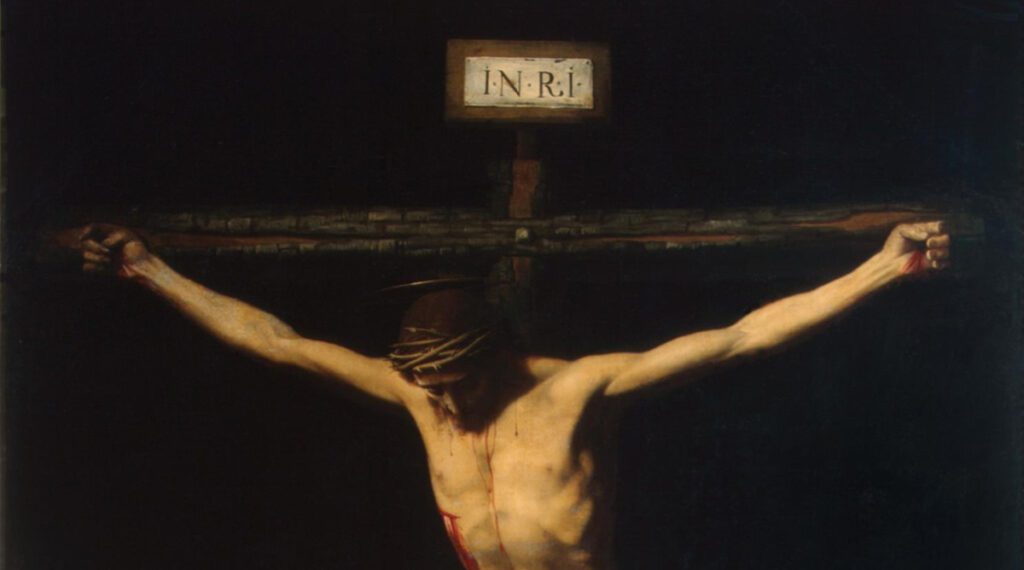In the Ignatian Exercises, we pray on Christ’s Passion, invited to be with Him every step of the way. Slowly taking in each small detail, the questions arise: What was He feeling? His emotions? What were His thoughts? Beautiful devotions given to us by the Church typically focus our attention on His physical suffering, all that He went through to redeem our sins. In the Exercises, we enter into His emotional suffering.
In His perfect humanity, which was always in the Beatific Vision of our Father and in union with His Divine nature, He felt the deepest of emotions. We cannot truly imagine this because of our broken humanity. He experienced the totality of joy, of compassion, of pity. Likewise, though, He also suffered the totality of sorrow. Jesus, Son of God, a Divine person, experienced all of these in His human Sacred Heart.
Several days before His passion, He had wept over Jerusalem (Luke 19:41-42). It wasn’t the destruction of the temple that saddened Him. It was the loss of the souls who would die still having rejected Him. Fast forward to the Passover, and His passion begins. Now He is in the garden of Gethsemani having experienced all the sin and evil that mankind would enact until His return at the close of time (Matthew 26:36-46). And He was completely alone to suffer this with His Father. Even if His disciples had remained awake, they would not have been capable of understanding His suffering. He had to endure this alone.
Those who had arrested Jesus led him away to Caiaphas the high priest, where the scribes and the elders were assembled. Peter was following him at a distance as far as the high priest’s courtyard, and going inside he sat down with the servants to see the outcome. The chief priests and the entire Sanhedrin kept trying to obtain false testimony against Jesus in order to put him to death, but they found none, though many false witnesses came forward. Finally two came forward who stated, “This man said, ‘I can destroy the temple of God and within three days rebuild it.’” The high priest rose and addressed him, “Have you no answer? What are these men testifying against you?” But Jesus was silent. (Matthew 26:57-63)
The high priest questioned Jesus about his disciples and about his doctrine. Jesus answered him, “I have spoken publicly to the world. I have always taught in a synagogue or in the temple area where all the Jews gather, and in secret I have said nothing. Why ask me? Ask those who heard me what I said to them. They know what I said.” When he had said this, one of the temple guards standing there struck Jesus and said, “Is this the way you answer the high priest?” (John 18:19-22)
Then they spat in his face and struck him, while some slapped him. (Matthew 26:67)
In quick time He is before the Sanhedrin. False accusations are made, one after another. He does not defend Himself. Their lies have no power over Him; all lies die out like the grass. What has power over me? How have I allowed it to? Close to Him, no harm can come to me…do I believe this?
Meanwhile, Peter is in the garden. Once, twice, thrice he denies belonging to Jesus. Jesus tells the truth and is slapped for it. Peter denies the truth and avoids suffering. Or did he? He avoided physical suffering of any abuse that would have occurred if his association with Jesus was known. But he suffered tremendously in his heart the knowledge of his lies. As Peter suffered the horror of his own actions, at that very moment Jesus was taking on Peter’s heartache into His very own. His Sacred Heart experiencing the totality of Peter’s rejection of love.
He does the same for us. For God (who is not restricted within time), the past, present and future are always present. Each time we deny Him, whether in small ways of neglect or in acts of sin, Jesus in His humanity suffers our rejection of His love. He takes on our pain and suffering; He takes the slap in the face for you. It is important to ‘own’ our sin. But it is also important to stand in awe of Him who in that very same moment has chosen to suffer the consequence of it.
For it is not an enemy that reviled me—
that I could bear—
Not a foe who viewed me with contempt,
from that I could hide.
But it was you, my other self,
my comrade and friend (Psalm 55:13-14)
Scripture tells us that true friendship is like having another ‘self’. We have been created for this friendship with God. Friends become another ‘self’ in the sharing of their heart with one another. So too in our friendship with Jesus. He desires to become another ‘self’ by transforming our hearts to be like His. His friendship is never ending; He even considered Judas His friend to the very end (Matthew 26:50).
Jesus, meek and humble of heart, make my heart like unto Thine. (Litany of the Sacred Heart of Jesus)
The Precious Blood which runs through Jesus’ Sacred Heart came first from the Immaculate Heart of Mary. He returned that Blood to her as she wept at the foot of His cross. Just as His heart broke for her sorrow, It breaks for you too.
Who would believe what we have heard?
To whom has the arm of the Lord been revealed?
He grew up like a sapling before him,
like a shoot from the parched earth;
He had no majestic bearing to catch our eye,
no beauty to draw us to him.
He was spurned and avoided by men,
a man of suffering, knowing pain,
Like one from whom you turn your face,
spurned, and we held him in no esteem.
Yet it was our pain that he bore,
our sufferings he endured.
We thought of him as stricken,
struck down by God and afflicted,
But he was pierced for our sins,
crushed for our iniquity.
He bore the punishment that makes us whole,
by his wounds we were healed.
(Isaiah 53:1-5)
Ad Majorem Dei Gloriam.
_____________________________________
This post was originally published on The Face of Grace Project and is reprinted here with permission.
Image by Alonso Cano via Wikimedia




